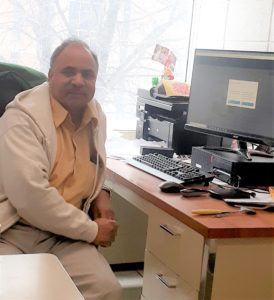Dandelions, not so useless anymore

Dr. Pandey in his office. Photo by Jada Tsunade.
Researchers at the University of Windsor have brought the newest ingredient in the ongoing struggle against cancer to peer review.
The dandelion has been considered a useless weed. It has spores that fly all over in the summertime giving people with allergies to rely on Claritin. However, for cancer patients experts at the biology lab of the University of Windsor say the root of the weed may just save their lives. Some believe dandelion root along with other natural ingredients may be the missing piece in the fight against the illness.
Siyaram Pandey is a biology professor at the university and instrumental in the discovery of the alternate uses of the natural ingredients they are looking at.
“In 2009 my expertise was in cell death getting cancer cells to commit suicide. And in doing so I started looking for compounds that kills cells, only in cancer selective,” said Pandey. “The fact is that many of the drugs used to treat cancer all trigger cell death unfortunately they are not selective. They also induce cell death in healthy cells and that’s why many people have very serious side effects from the treatment.”
Pandey said while they were working on this project an oncologist called him and told him two of her patients who were not responding well to chemotherapy returned to her and said their cancer counts were lower.
“She asked why and they said they took dandelion root in tea. We started testing it and indeed it started killing the cancer cells,” said Pandey.
Locnath Chawla is a philanthropist and career factory worker who donated $50,000 to the cancer study towards the university and plans to donate $50,000 more soon.
“I was getting old and I don’t have any family here I have a few dollars in the bank and if I die the government will take it. I have donated to many charities before like Downtown Mission and homeless shelters,” said Chawla. “Then I was talking to my friend and I told him I’m wasting my money here and I want to do something good. He said, ‘why don’t you donate to the cancer study at the university?’.”
Chawla met with Pandey because his mother had cancer and she suffered with chemotherapy and radiation.
“I hope my giving tells everyone to give and if everyone can give $25 or $100 to the cause we can help millions and millions of people,” said Chawla.
The state of the research has been sent to peer review and the technology has been transferred to Advanced Orthomolecular Research Inc. in Canada, they are working to bring it to market. It is unknown when, but Pandey said his hopes are high it will be helping people soon.


